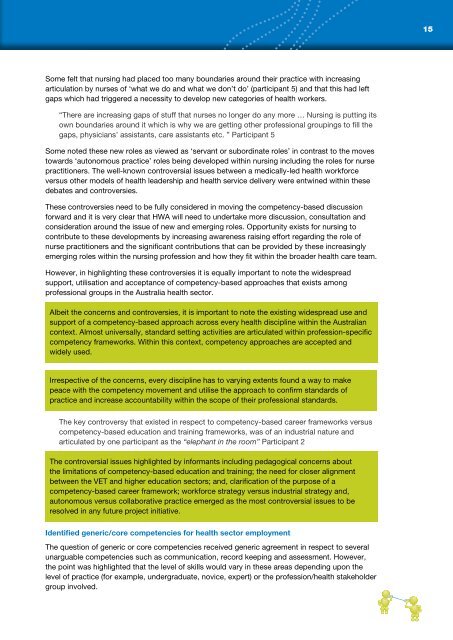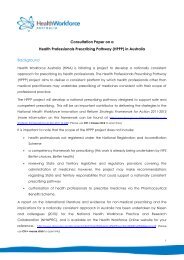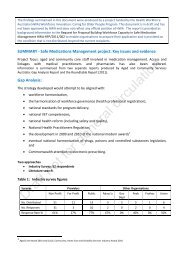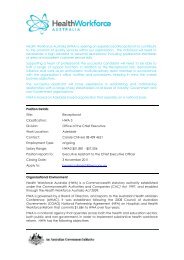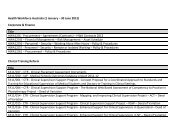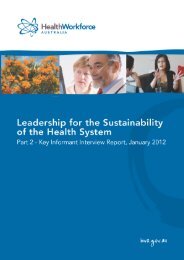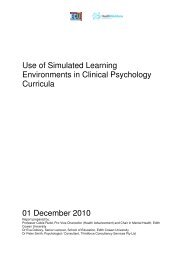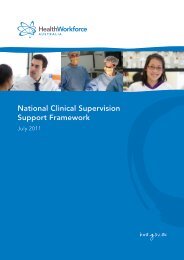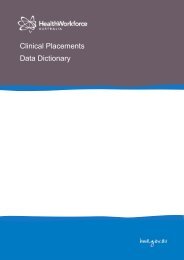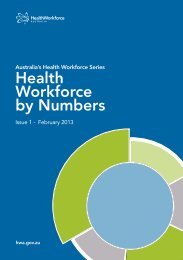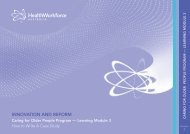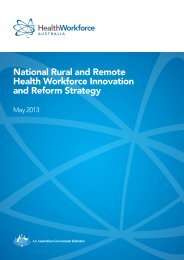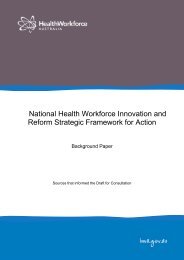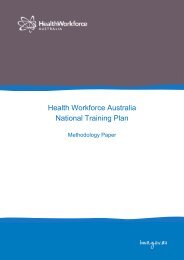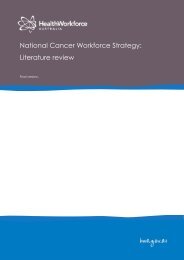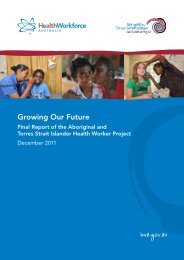Listening to our Stakeholders - Health Workforce Australia
Listening to our Stakeholders - Health Workforce Australia
Listening to our Stakeholders - Health Workforce Australia
Create successful ePaper yourself
Turn your PDF publications into a flip-book with our unique Google optimized e-Paper software.
15<br />
Some felt that nursing had placed <strong>to</strong>o many boundaries around their practice with increasing<br />
articulation by nurses of ‘what we do and what we don’t do’ (participant 5) and that this had left<br />
gaps which had triggered a necessity <strong>to</strong> develop new categories of health workers.<br />
“There are increasing gaps of stuff that nurses no longer do any more … Nursing is putting its<br />
own boundaries around it which is why we are getting other professional groupings <strong>to</strong> fill the<br />
gaps, physicians’ assistants, care assistants etc. ” Participant 5<br />
Some noted these new roles as viewed as ‘servant or subordinate roles’ in contrast <strong>to</strong> the moves<br />
<strong>to</strong>wards ‘au<strong>to</strong>nomous practice’ roles being developed within nursing including the roles for nurse<br />
practitioners. The well-known controversial issues between a medically-led health workforce<br />
versus other models of health leadership and health service delivery were entwined within these<br />
debates and controversies.<br />
These controversies need <strong>to</strong> be fully considered in moving the competency-based discussion<br />
forward and it is very clear that HWA will need <strong>to</strong> undertake more discussion, consultation and<br />
consideration around the issue of new and emerging roles. Opportunity exists for nursing <strong>to</strong><br />
contribute <strong>to</strong> these developments by increasing awareness raising effort regarding the role of<br />
nurse practitioners and the significant contributions that can be provided by these increasingly<br />
emerging roles within the nursing profession and how they fit within the broader health care team.<br />
However, in highlighting these controversies it is equally important <strong>to</strong> note the widespread<br />
support, utilisation and acceptance of competency-based approaches that exists among<br />
professional groups in the <strong>Australia</strong> health sec<strong>to</strong>r.<br />
Albeit the concerns and controversies, it is important <strong>to</strong> note the existing widespread use and<br />
support of a competency-based approach across every health discipline within the <strong>Australia</strong>n<br />
context. Almost universally, standard setting activities are articulated within profession-specific<br />
competency frameworks. Within this context, competency approaches are accepted and<br />
widely used.<br />
Irrespective of the concerns, every discipline has <strong>to</strong> varying extents found a way <strong>to</strong> make<br />
peace with the competency movement and utilise the approach <strong>to</strong> confirm standards of<br />
practice and increase accountability within the scope of their professional standards.<br />
The key controversy that existed in respect <strong>to</strong> competency-based career frameworks versus<br />
competency-based education and training frameworks, was of an industrial nature and<br />
articulated by one participant as the “elephant in the room” Participant 2<br />
The controversial issues highlighted by informants including pedagogical concerns about<br />
the limitations of competency-based education and training; the need for closer alignment<br />
between the VET and higher education sec<strong>to</strong>rs; and, clarification of the purpose of a<br />
competency-based career framework; workforce strategy versus industrial strategy and,<br />
au<strong>to</strong>nomous versus collaborative practice emerged as the most controversial issues <strong>to</strong> be<br />
resolved in any future project initiative.<br />
Identified generic/core competencies for health sec<strong>to</strong>r employment<br />
The question of generic or core competencies received generic agreement in respect <strong>to</strong> several<br />
unarguable competencies such as communication, record keeping and assessment. However,<br />
the point was highlighted that the level of skills would vary in these areas depending upon the<br />
level of practice (for example, undergraduate, novice, expert) or the profession/health stakeholder<br />
group involved.


